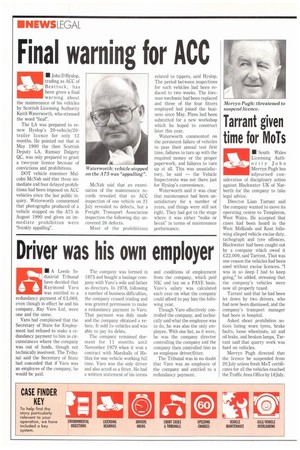Final warning for ACC
Page 14

If you've noticed an error in this article please click here to report it so we can fix it.
ai trading as ACC of
Beattock, has • John D Hyslop, Beattock, has been given a final warning about the maintenance of his vehicles by Scottish Licensing Authority Keith Waterworth, who stressed the word "final".
The LA was prepared to renew Hyslop's 20-vehicle/20trailer licence for only 12 months. He pointed out that in May 1990 the then Scottish Deputy LA, Ramsay Dalgety QC, was only prepared to grant a two-year licence because of convictions and prohibitions.
DOT vehicle examiner Malcolm McNab said that three immediate and four delayed prohibitions had been imposed on ACC vehicles since the last public inquiry. Waterworth commented that photographs produced of a vehicle stopped on the A75 in August 1990 and given an immediate prohibition were "frankly appalling". McNab said that an examination of the maintenance records revealed that an ACC inspection of one vehicle on 21 July revealed no defects, but a Freight Transport Association inspection the following day uncovered 26 defects.
Most of the prohibitions related to tippers, said Hyslop. The period between inspections for such vehicles had been reduced to two weeks. The foreman mechanic had been replaced and three of the four fitters employed had joined the business since May. Plans had been submitted for a new workshop which he hoped to construct later this year.
Waterworth commented on the persistent failure of vehicles to pass their annual test first time, failures to turn up with the required money or the proper paperwork, and failures to turn up at all. This was unsatisfactory, he said — the Vehicle Inspectorate was not there just for Hyslop's convenience.
Waterworth said it was clear that maintenance had been unsatisfactory for a number of years, and things were still not right. They had got to the stage where it was either "make or break" in terms of maintenance performance.












































































